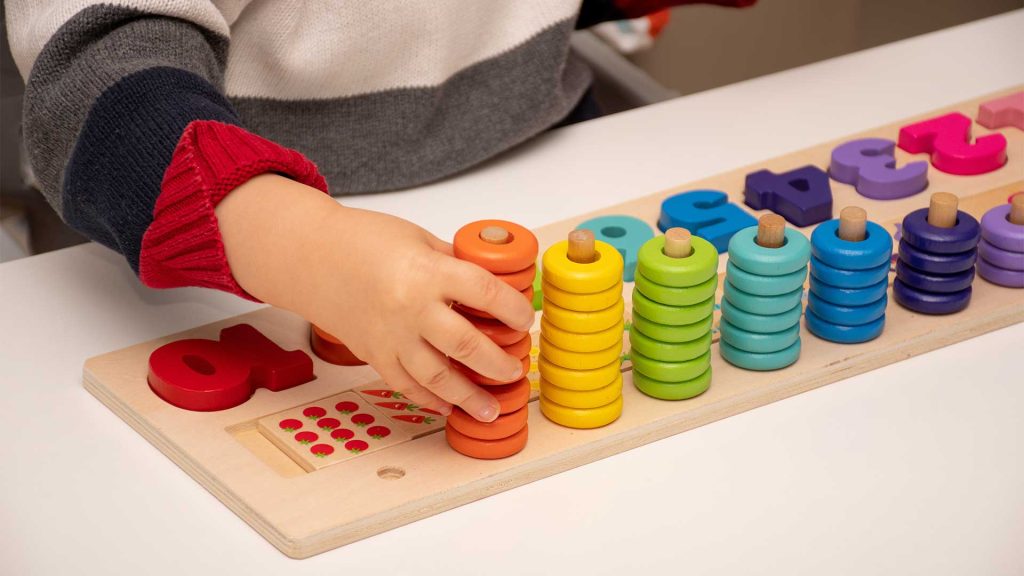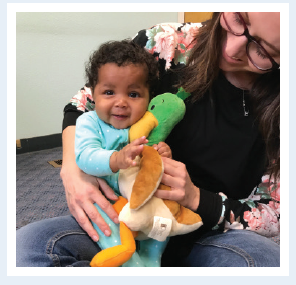Infant Learning Program
Early Intervention
ACCA’s Infant Learning Program (ILP) provides early intervention services to children birth to three years who experience a developmental delay or disability, with a focus on supporting and strengthening the whole family.

Program Focus
By collaborating and working together with the parent(s) or caregiver, early intervention focuses on helping eligible babies and toddlers learn the basic and brand-new skills that typically develop during the first three years of life.
Services may also be provided to address the needs and priorities of the child’s family. Family-directed services are meant to help family members understand the special needs of their child and how to enhance his or her development.
Helping Develop
- Gross motor (playing on the floor, rolling, crawling, and walking);
- Fine motor (control of the upper body, shoulders, arms, hands, and fingers, finger skills, eye-hand coordination);
- Cognitive (play, understanding new concepts, solving problems);
- Communication (use of sounds, gestures, and words to communicate, listen, and understand others);
- Social/emotional (playing, feeling secure and happy, interactions with others); and
- Self-help (eating, dressing, sleeping).

Who is Eligible?
Early intervention is intended for children birth to three who have a developmental delay or disability. In the state of Alaska, children may qualify for services with ILP if they have a delay of 50% or greater in an area of development, if they have a diagnosed medical condition or disability, or based on Clinical Opinion of the ILP team.
Eligibility is determined by evaluating the child (with parents’ consent) to see if there is a delay in development or a disability. Eligible children can receive early intervention services from birth through the third birthday.
The Assessment Process
During an eligibility determination, the assessment team will work with the family to explain the process and complete the assessment. Parents and/or caregivers may be asked to provide information about the child’s development and medical history, and standardized and non-standardized testing tools will be used to look at skills in all areas of development.
Following the assessment, observations, findings, and recommendations will be discussed with the family. The assessment team will later complete an assessment report which will include all of this information for the family, and can be shared with other providers with parent consent.
The IFSP
An Individualized Family Service Plan (IFSP) is developed by the parents and early intervention team for each child, and is the family’s written plan for early intervention services.
The plan, based on assessment results, includes the intervention strategies designed to assist the family to achieve desired developmental outcomes and describes the services required to facilitate the child’s progress. Plans are reflective of parental priorities and sensitive to the culture and values of the family.
Services take place in the family’s home or other community settings where the child and family spend time.
A staff member will be assigned as the service coordinator and primary provider for each child enrolled in the program. The service coordinator will work closely with the family and other caregivers to incorporate intervention strategies into the child’s daily routines.
The service coordinator or the family may request consultation periodically from other staff members.
All members of the early intervention team are highly qualified and credentialed as Early Intervention Specialists by the Alaska Department of Health and Social Services.
Understanding an IFSP
The early intervention team may consist of:
Speech-Language Pathologist
Occupational Therapist
Physical Therapist
Developmental Therapist
Special Educator
Social Worker
Teacher of the Visually Impaired
Services & Rights
Paying for Services
All evaluation and service coordination services are provided at no cost to families. Early Intervention therapy services are funded primarily by private health insurance, public benefits, and state and federal funding. The service coordinator will walk each family through this process.
*Effective July 1, 2023, the State of Alaska has discontinued the billing of the annual participation fee.*
Transition
ILP serves children from birth until their third birthday. Around the child’s second birthday, the service coordinator will begin to have conversations with the family about the transition process and possible options, including referrals and appropriate programs and services for the child. The transition is documented within the child’s ILP records.

Parents Rights
Developmental Milestones
ASQ-3
ASQ-SE2
The Ages and Stages Questionnaire Social Emotional-2 is an additional questionnaire which focuses on your child’s development in the areas of Social Skills and Emotional Development.
Resources
REFERRALS
Families are often referred to ILP by a community health or social services provider, including pediatricians and other physicians, public health, WIC, Early Head Start, child care providers and Child Protective Services.
However, parents don’t have to wait for a referral to early intervention. If you’re concerned about your child’s development, you may contact your local program directly and ask to have your child evaluated. That evaluation is provided at no cost to the family.
The early intervention program provides services to all eligible children and their families without regard to race, color, religion, sex, age, country of national origin, marital status, sexual orientation, political affiliation or handicapping condition.
Referral Specialist
Sarah Kleinschmidt
Email: sarah.kleinschmidt@alaskacenter.org
